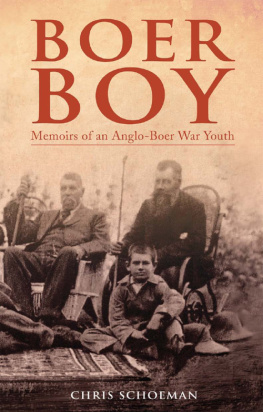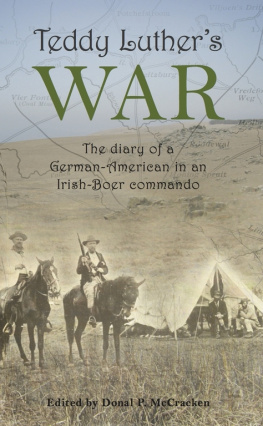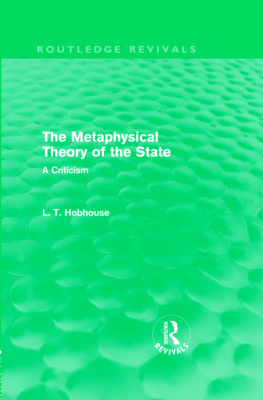
Praise for The Compassionate Englishwoman:
The Compassionate Englishwoman is an arresting work of historical scholarship that combines a shocking argument concerning British atrocities in the Boer War and a mesmerising account of Emily Hobhouses determination to end the cruelty and deaths associated with the notorious British concentration camps. At a time when the history of humanitarianism is receiving increased attention, Emily Hobhouse stands out as a passionate crusader, who was prepared to travel around the world, enter war zones and challenge authorities in both Britain and South Africa to bring the suffering of women and children to an end.
Well connected, but without formal power, Emily Hobhouse is a foremost example of all those courageous women who have agitated for the rights of humanity and thus paved the way for expanded conceptions of human rights.
Marilyn Lake, Professor in History at the University of Melbourne and Immediate Past-President of the Australian Historical Association.
A well-researched and readable account of the humanitarian work of Emily Hobhouse, offering a too little aired perspective on the atrocities of the British forces in the Anglo-Boer War. The book is likely to attract a wide readership among those interested in military history, imperialism, colonial affairs, womens lives, South African history, and humanitarian concerns.
Dorothy Driver, Professor in English at Adelaide University.
In following the work of Emily Hobhouse in South Africa in the Anglo Boer War, Robert Eales provides a sensitive account of the sufferings of the Boer women and children who risked death rather than beg their husbands to surrender. On the part of Emily Hobhouse it is a story of determination and persistence and we see the human spirit at its best.
Jennifer Hobhouse Balme, Author of books on Emily Hobhouse and custodian of her papers.
For Jane
and our children
With love

THE COMPASSIONATE ENGLISHWOMAN
Emily Hobhouse in the Boer War
Published by Middle Harbour Press Pty Ltd Australia
Email: middleharbourpress@bigpond.com
http://www.middleharbourpress.com
Copyright Robert Eales 2014
National Library of Australia Cataloguing-in-Publication entry
Creator: | Eales, Robert, author. |
Title: | The Compassionate Englishwoman : Emily Hobhouse in the Boer war / Robert Eales. |
ISBN: | 9780992527624 (paperback)
9780992527631 (ebook) |
Notes: | Includes bibliographical references and index. |
Subjects: | Hobhouse, Emily, 1860-1926 |
Women philanthropists--Biography. |
South African War, 1899-1902--War work. |
Dewey Number: 361.74092 |
All rights reserved. No part of this book may be reproduced, stored in a retrieval system, distributed or transmitted in any form or by any means, electronic, mechanical, photocopying, recording or otherwise, without the prior written permission of the publisher. To request permission, email the publisher with the subject heading Attention: Permissions at .
Disclaimer:
This book is a work of history. All reasonable efforts have been made and care has been taken to verify the information contained herein. All reasonable efforts were made to obtain permission to use materials reproduced in this book, except where the copyright is believed to have expired. The publisher welcomes further information in this regard.
Contents
List of maps and photographs
Southern Africa in 1899 (map)
Isnt the whole business of ascribing responsibility a kind of cop-out? We want to blame an individual so that everyone else is exculpated. Or we blame a historical process as a way of exonerating individuals. Or its all anarchic chaos, which has the same consequence. It seems to me that there is - was - a chain of individual responsibilities, all of which were necessary, but not so long a chain that everybody can simply blame everyone else. But of course my desire to ascribe responsibility might be more a reflection of my own cast of mind than a fair analysis of what happened. Thats one of the central problems of history, isnt it, sir?
Julian Barnes, The Sense of an Ending, 2011
E mily Hobhouse embarked at Southampton on 7 December 1900, bound for Cape Town. She was not a good sailor and did not enjoy the next two weeks at sea. It was not the motion of the ship that particularly troubled her but the enforced idleness. She did not know what to expect on arrival and was not confident that she would be able to accomplish what she had in mind. The sooner she arrived, the sooner she could make an assessment and begin preparations. She contented herself with asking her fellow passengers to tell her all they knew of southern Africa and studying the language of the people she would encounter. Boer Dutch she called it.
Emily was heading for a land at war. She was concerned for the women and children caught in the fighting in the interior of southern Africa. She hoped to discover the nature and extent of their difficulties and to deliver assistance from the modest resources at her disposal.
When the ship arrived off Cape Town in the middle of the night, the small harbour was full and so they anchored in the bay. The next morning, Emily rose early. Excited, and driven by her sense of urgency, she talked her way onto the first support vessel that came alongside the ship and made her way to land, leaving her luggage on board. Passengers of her class were supposed to disembark later in the day.
Ashore, evidence of war abounded. The harbour was full of troopships and the docks were piled high with military supplies. Soldiers in khaki were everywhere. Idle locals hung about hoping for a chance to earn a quick shilling amid all the activity. Prices in the town were very high, some higher than in London.
When her fellow passengers landed, they found that accommodation was hardly obtainable and Emily assisted her friends, the Rowntrees, to find lodgings. She did not have to concern herself with this difficulty on her own account, for she was expected and arrangements had been made. Friendly faces came to meet her, her luggage was claimed, and they transported her around the foot of the mountain to a suburb of gracious colonial homes. By late afternoon, she was eating fresh figs and apricots on a spacious veranda and nursing a pet meerkat as if she had known it always.
It was high summer, and the weather contrasted greatly with the cold, wet and wintry conditions she had left behind. The great, moody mountain towered in the background, as it does over everything that happens in Cape Town. Emily had not given much thought to the scenery that would greet her on her arrival, and she was smitten from that first sunrise on the ship in the bay.













